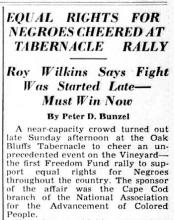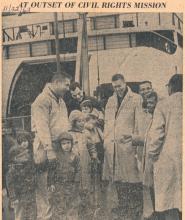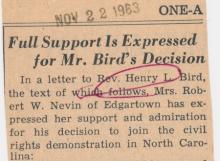The Rev. Henry L. Bird, rector of the Episcopal Parish on Martha’s Vineyard, is with a group of ten clergymen, this week in Williamston, N. C., engaged in non-violent action in the cause of civil rights. His decision to go was announced during the service of morning prayer, Sunday at St. Andrew’s Church, Edgartown.
Mr. Bird said that his decision was made with approval of less than the majority of the parish vestry. He and officers and vestry members had discussed the possibility of his going at a special meeting last week. It is known, however, that he went with the blessing of his official church family. In reaching his decision Mr. Bird had also sought the advice of Island Negro friends and his archdeacon, the Ven. Lewis Sheen. Mr. Bird also went with the wholehearted approval and support of his associate, the Rev. Elliot F. Gauffreau.
Leaving the Island Monday, Mr. Bird met his fellow clergymen at St. Paul’s Cathedral, Boston, there leaving in a bus at 4. The group included four or five Episcopalians, the others being Baptists and from the United Church of Christ.
At Williamston the group had plans for mass meetings and instruction in non-violent action. They are members of the Massachusetts unit of the Southern Christian Leadership Conference whose national leader is the Rev. Dr. Martin Luther King Jr.
Williamston is a small agricultural community in the eastern part of North Carolina. Its 6,000 population is almost equally divided between Negroes and white people. Peaceful demonstrations have been conducted there for several months. The New England clergymen will be the first white people to enter the demonstrations in the town, however.
When Mr. Bird left the Island on the 9 a. m. boat Monday, a small group of well-wishers joined his wife and children to wave farewell.
Mr. Bird was welcomed at Woods Hole when the ferry arrived Monday by a group of Falmouth friends.
The Rt. Rev. Anson Phelps Stokes Jr., bishop of the Episcopal Diocese of Massachusetts, said, “These men are taking some risks, but they take them for an overriding and worthy purpose...They go to share the efforts of our Christian brothers in the South, just as we Northerners have been strengthened by the courage of many Southern brothers....”
Report from the Scene
In a couple of telephone calls home to his wife, Mr. Bird told of developments in the small town which yesterday morning were expected to end with the northern visitors in jail.
The first night after arrival the Massachusetts unit attended a rally, a meeting in the nature of a church service, attended by many women and children, and which Mr. Bird found deeply inspiring. They were trailed, following the rally, on their way to the homes where they were guests.
The next day they attended a demonstration in non-violent action, after which they were taken on a sightseeing trip, a trip which brought a startling episode. A truck bore down on the group, ran right toward them and their new friends. John Harman, a big fellow, was saved from injury when a woman pulled him from the path of what was apparently a vehicle being driven with malicious intent.
The police chief had made known that he would not allow any assembling, which Mr. Bird and his group considered a violation of constitutional right. They proceeded to ask for the permit to assemble and it was refused, with the warning that if the clergymen did assemble they would be arrested.
This was the situation yesterday morning, with the expectation of arrest and incarceration, since the northerners were determined they would gather to make a demonstration.
(TV news last night said that a group of ministers and Negroes had been arrested at Williamston.)
Mr. Bird’s Diary
A diary kept by Mr. Bird follows:
Nov. 11:
9 a. m. - Leave for Woods Hole on the S.S. Nantucket. Very grateful for group which saw me off, including Colbert Smith.
9:45 a. m. - Arrive Woods Hole; saw Walter and Freddie Stevenson, Bradford Brown of Cape Cod NAACP, met the board and others. Reporters asked questions and took pictures.
10:00 a. m. - Others show up to see me off on the bus, including Ted and Barbara Lockwood of Woods Hole.
10:30 a. m. - Bus leaves for Boston - heavy rain on the way to Boston.
12:35 p. m. - Arrive in Boston.
1:30 p. m. - Went to M.G.H. and visited Edith Meyer, Frances Osborne and Hugh Jones.
2:30 p. m. - Took subway to Park street station and St. Paul’s Cathedral. Waited on front porch until time to go inside. Watched Armistice Day parade. Rainy and gloomy.
3:00 p. m. - Go to the cathedral library and wait. Can hear the parade going by outside. Call home.
3:30 p. m. - Hear people arriving. Go downstairs to the basement hall of the cathedral. Paul Chapman, John Harman, Harold Melvin and others arriving, with families.
4 p. m. - TV, newspaper, etc., interviews. Much posing and questioning - even New Bedford channel 6.
5:30 p. m. - Finally, get going in two cars, one Colin Gracie’s from Trinity Church, Concord, and other Paul Chapman’s. Colin’s is a station wagon about six or seven years old, and Paul’s is a VW bus, and I am in the VW.
6 p. m. - We weave our way out of Boston and order supper at Howard Johnson’s in Walpole.
Really on the Way
7:30 p. m. - Finally move towards Providence and Connecticut Turnpike. We are now really on the way. Tried sleeping at various angles on the seats. Foggy driving. After getting through N. Y. C., put luggage on floor and sleep three across back seats and luggage space in the back of bus. I start driving from there, somewhere above New Brunswick, and took us through Delaware and to Elkton, Md., at gas stop, then sleeping in back until arrival in Richmond, Va.
Nov. 12:
7:30 a. m. - We ate breakfast in a downtown Negro tavern. Very good, clean, fresh live roses at each table and booth.
8:30 a. m. - Head for Williamston, N. C. Flatter and more open country. Cotton, peanuts, tall pines in evidence. Some tobacco. Stomach begins to tighten even more the closer we get.
Arrive in Williamston
12 p. m. - Arrive in Williamston almost abruptly, at Green’s Memorial Church. The church, a gray, white-shingled frame building across the street from small wooden negro homes. Greeted by Mr. Golden Frinks, S.S.L.C. field secretary for this area, and escorted into the church. Pews and wooden chairs face front - dark oak podium with Bible in center front, two dark oak ornate seats back of and at two side of Bible stand, as is common in so many churches. Also many S.C.L.C. signs propped and posted all around the room, all calling for an end to segregation in one way or another - i.e. “Jim Crow” poster for voter registration, etc.
12:30 p. m. - After talking and meeting with several different people, Mr. Frinks takes us to negro elementary school for lunch. Mr. Frinks wearing new blue overalls over shirt and tie and neat dark blue suit jacket, with S.C.L.C. button on lapel. Mr. Frinks about 35, six feet one inch, attractive, dark, mustache, friendly, convincing and obviously “completely sold” on what he is doing.
The school is modern, brick, clean - buses lined up along dirt drive leading to school, hostile stares from two white maintenance men working on one of the buses as we drive by. Go into crowded, but new and clean cafeteria for beans, hot dogs, coleslaw and biscuit lunch. Met some of children and cafeteria staff.
After lunch watched children on the playground. In distance two white men at buses standing, watching. Some load up and drive out, as go by two men wave. One responds with biting hostile call “jitterbug” (exactly what the word means we haven’t yet learned but the feeling was most obvious).
Returned to the Church
2 p. m. - We returned to the church, talked more with Mr. Frinks. A man from Associated Press interviewed Paul Chapman for about twenty minutes. We waited until about 4, talking with Mr. Frinks, and then were taken to the homes in which we were to be staying.
4 p. m. - John Harman and I are together in a nice small house belonging to a 30-35 year old woman who works in a cafe. We were warmly welcomed, shown a two-bed room, neat and clean as a whistle. We go to supper at the church tonight and a meeting afterwards. One cannot help but be impressed with him (Mr. Frinks).
He lives on a keg of dynamite twenty-four hours a day and says “After I die the cause won’t - you can’t beat it. I am alive now and that is what counts now.” He mentions a feeling of fear and said we would all have it in the stomach, but once tried in a demonstration, it will go away. (I wish I could be so sure.)

Editorial: Conscience
If the time in which we live proves anything at all, it proves the importance of conscience. One may reasonably say that the same importance exists always, but the need for decision and action is surely greatest in periods of upheaval, social change, and the resolution of profound moral issues.
The courage of moral and ethical conviction cannot be a force in our world unless those whose conscience and humanity are deeply stirred will act, even sometimes against convention or protocol or counsels of restraint. We think the Rev. Henry L. Bird is entitled to the support of these words in his deep commitment on the issue of civil rights which, no matter who approves or disapproves, is a vintage being trampled out in our country before our eyes.










Comments